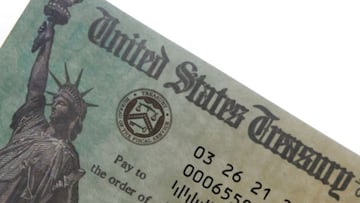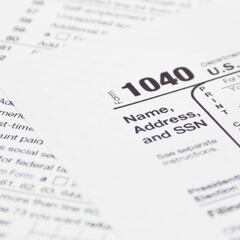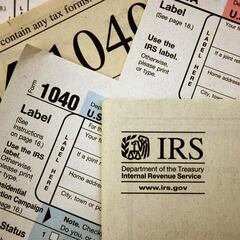Can you lose stimulus checks if you don't file taxes before 2021 deadline?
If you want your stimulus money this year you will need to file your 2020 tax return this year, but you may be able to get some with next year's refund.

The US federal government has authorized three separate Economic Impact Payments (EIP) over the past year, more commonly known as stimulus checks. These are advanced payments of the Recovery Rebate Credit, two of which were for the 2020 fiscal year and the third for the 2021 fiscal year.
The latest round of EIPs, which will see eligible Americans receiving up to $1,400 direct payments per adult and dependent, must be paid out by the Internal Revenue Service (IRS) before the end of the year. However, like the previous two EIPs, taxpayers will be able to claim any money they were underpaid this year when they file in 2022.
Also see:
- How to file for an extension with the IRS
- What happens if I don’t file before the deadline?
- IRS will send unemployment tax break refund in two phases
- Child Tax Credit and Stimulus Checks: how do they differ?
The eligibility for a stimulus check is calculated based on a taxpayer’s prior year income
Some of the confusion about stimulus check payments comes from the fact that they are paid based on a taxpayer’s income from the previous year but the eligibility requirements correspond to the year in which they were authorized. So, before a taxpayer has told the IRS what his or her actual financial situation is, the agency sends out a payment based on the information that was available at the time.
This means that an individual or household could be underpaid. In the most recent round of EIP the IRS has been sending out “plus-up” payments as it processes 2020 tax returns if the agency used a 2019 tax return to calculate eligibility and the current return revealed that more money was due to a taxpayer than had been sent. This is because the government wanted to get the money out as fast as possible to help those struggling and boost spending to help the economy rebound.
#IRS extends additional tax deadlines that would normally fall on April 15 to May 17. Read more: https://t.co/G3yk4zsgqL pic.twitter.com/50RcFUO2NL
— IRSnews (@IRSnews) May 12, 2021
Taxpayers will be able to correct underpayments in 2022
Now the good news is that if you were overpaid there is no clause in the covid-relief bills for the IRS to claw back any money that was sent to people who saw their fortunes improve during the pandemic that would have made them ineligible for a payment or for less than they received. The opposite was expected to be the norm, so when people filed their 2020 tax returns this spring, they could claim any money they had missing from the first two EIPs, the $1,200 and $600 stimulus checks through the 2020 Recovery Rebate Credit.
Any outstanding money from the tax credit due to a taxpayer would be sent as part of their tax refund minus any taxes that individual owed. The thinking goes that the economy will recover in 2021 so few people will need to claim the 2021 Recovery Rebate Credit, the advanced payment on the third EIP. But the economic recovery is still a work in progress so some that didn’t receive the full or any of the $1,400 stimulus payment may just be able to claim it when they file in 2022.
#IRSTaxTip: File your tax return on time, even if you can’t pay your tax bill in full, to avoid interest and penalties. See: https://t.co/khvZenk5pZ #IRS pic.twitter.com/9290bDnvtd
— IRSnews (@IRSnews) May 12, 2021
Will you lose your stimulus money if you don’t file a tax return before the 2021 deadline?
The answer is yes, and no. If you can’t file your 2020 tax return by 17 May, you can ask for an automatic tax filing extension to buy time until 15 October. This will give you more time but delay any payment that you could receive. Regardless, you will have to file to get any stimulus money that might be due to you.
The IRS gives taxpayers three years to claim a tax refund from the filing date set the year the tax return was supposed to be filed, or the date that the taxpayer filed that year. If you owe money that is not the case and you could face fines and penalties for not filing on-time.
The #IRS urges anyone experiencing homelessness who has a smartphone or access to a computer to take advantage of #IRSFreeFile to claim the 2020 Recovery Rebate Credit and other tax benefits. https://t.co/3byJqk9fiF pic.twitter.com/rMdZdRoOBr
— IRSnews (@IRSnews) May 11, 2021
Related stories
The IRS announced that they are looking for over 1.3 million Americans who are owed a tax refund for 2017. Because the filing deadline was extended this year, they got a break and will have until 17 May but after that the government will hold on to the money for good. This would be the case for the stimulus payments as well three to four years from now if a taxpayer doesn’t owe any taxes for 2020 or 2021 but instead were owed money. Since the stimulus payments are an advanced payment on a refundable credit, if the money has not paid out it can be claimed as a tax refund.
But best not to leave for tomorrow what you can do today.
- IRS
- Coronavirus stimulus checks
- USA coronavirus stimulus checks
- Covid-19 economic crisis
- Science
- Coronavirus Covid-19
- Economic crisis
- Inland Revenue
- Taxes
- United States
- Pandemic
- Coronavirus
- Recession
- Tributes
- North America
- Economic climate
- Virology
- Outbreak
- Infectious diseases
- Public finances
- Microbiology
- Diseases
- America
- Medicine
- Economy
- Health
- Life sciences
- Biology


